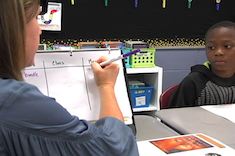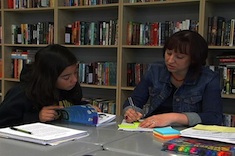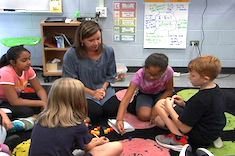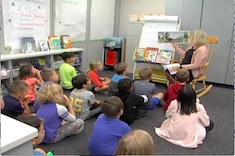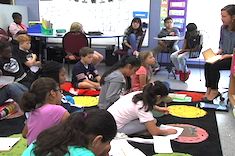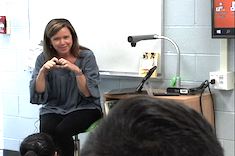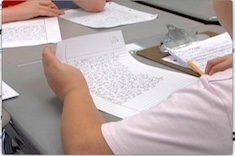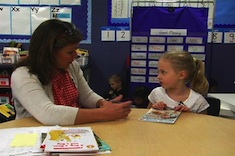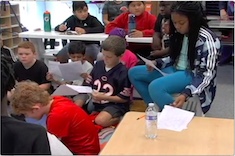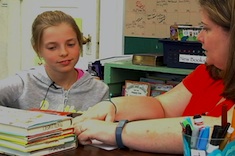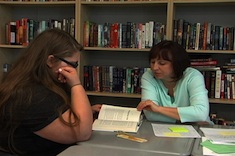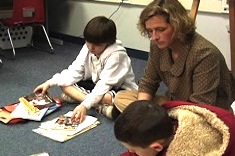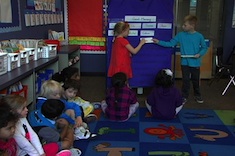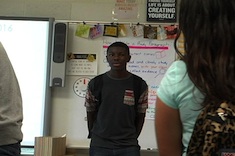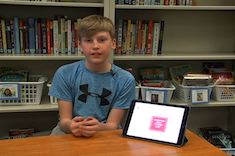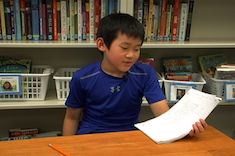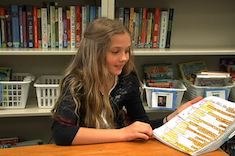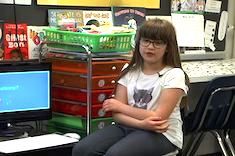Videos
Here is where you’ll find all the latest videos from our contributors. These videos are all captured in classrooms with crews using multiple cameras during regularly scheduled reading and writing workshops.
Latest Content
First Graded Guided Group: Chunking Words
Melissa Atwood leads a first-grade guided reading group. The focus at the start of the lesson is on chunking words. This is the first video in a two-part series.
Fifth-Grade Vocabulary Group
Dana Murphy meets with a group of fifth graders to work on strategies for understanding unknown words.
Writing Partner Feedback in Fifth Grade
Fifth-grade writers in Franki Sibberson’s classroom encourage each other and suggest revisions to their opinion-writing drafts in partner teams.
Characters, Choices, and Graphic Novels: Eighth-Grade Reading Conference
Christy Rush-Levine confers with Nia over the graphic novel she is reading. They discuss the choices characters make.
30-Second Pair-Share
Sean Moore leads his second graders in a quick pair-share to help everyone reflect on what they learned during independent reading.
Building Conversation Skills in Book Clubs
Fifth graders use a visual tool to help them build on each other’s ideas in book clubs. They are applying a strategy demonstrated in an earlier minilesson taught by Dana Murphy.
Minilesson: Building Conversations in Book Clubs
Dana Murphy leads a minilesson on book club conversations, using a fishbowl strategy and building blocks to support more sophisticated discussions.
Comparing Authors Minilesson
Jen Court uses text sets from three authors to help second graders ferret out different elements of the authors’ styles.
Writing Endings Minilesson in Fifth Grade
A classic anchor text for many teachers is Charlotte’s Web. In this week’s video, Dana Murphy seamlessly integrates a brief excerpt from it into a writing minilesson on endings in her fifth-grade classroom.
Reinforcing Workshop Norms
In this quick video, Dana Murphy shows how she leads her fifth graders with a kinesthetic reminder of workshop norms before beginning independent work.
Fifth-Grade Small Group: Paragraphs
Dana Murphy meets with a group of fifth graders to help students develop paragraphing skills, using a peer’s mentor text.
Conferring to Connect: First-Grade Reading
Bitsy Parks confers with first grader Ella about the Brown and Pearl book series, and then listens to Ella read. She closes the conference by encouraging Ella to make more personal connections to books.
Writing Share Circle in Fifth Grade
Here are some excerpts from a writing share circle in Dana Murphy’s fifth-grade classroom. Each student shares a one- to two-sentence excerpt from the writing they completed during the day’s workshop.
Creating a Realistic Fiction Stack
Katherine Sokolowski confers with a fifth grader who is looking for book recommendations. She creates a stack of realistic fiction books based on the student’s interests.
Building Reading Skills Book to Book: Conferring with Bridget
Christy Rush-Levine confers with eighth grader Bridget, coaxing her to compare and contrast the reading experience and plot twists in books.
Owl Research: Getting Organized
Andrea Smith checks in on a group of boys who are doing research into owl habitat, helping them organize their work and plans.
First-Grade Read Alouds During Transitions
This brief video is an excerpt from a read aloud in a first-grade classroom during morning snack break. You’ll notice Bitsy Parks uses a projector so students can eat at tables and desks, and makes quick connections to other books.
Spacing Words: Kindergarten Small Group
Tammy Mulligan uses another kindergartner’s writing as a mentor text for teaching young children how to use spaces in their writing in this demonstration small group.
Student Greeting
Students in the first-grade classroom of Bitsy Parks lead a morning greeting at the start of the day. It’s a quick activity to check attendance, build reading skills, and help students learn the names of classmates in the community.
Voices Mantra
Christy Rush-Levine’s eighth graders lead their classmates in a “voices” mantra. This shared chant created together starts each class with a sense of community and strength.
Read-Aloud Annotations: Google Slides
In this video series, Franki Sibberson’s fifth graders share their strategies for annotating the class read aloud. In this installment, Antonio shares his Google Slides.
Read-Aloud Annotations: Google Docs for Questions
In this video series, Franki Sibberson’s fifth graders share their strategies for annotating the class read-aloud. In this installment, Lauren uses Google Docs to record questions to explore as she listens.
Read-Aloud Annotations: Expectation and Reality
In this video series, Franki Sibberson’s fifth graders share their strategies for annotating the class read-aloud. In this installment, Lizzie uses her notebook to focus on expectations and reality for characters, especially when it comes to stereotypes.
Read Aloud Annotations: Using Google Slides to Focus
In this video series, Franki Sibberson’s fifth graders share their strategies for annotating the class read-aloud, In this installment, Reagan uses Google Slides to focus her thoughts and analyze different characters.
Read-Aloud Annotations: Thoughts to Themes
In this video series, Franki Sibberson’s fifth graders share their strategies for annotating the class read-aloud. In this installment, Stone uses Google Slides to record thoughts and tease out themes.
Read Aloud Annotations: Predictions
In this video series, Franki Sibberson’s fifth graders share their strategies for annotating the class read aloud. In this installment, Sharvari uses Google Slides with text boxes to record predictions and thinking.
Read Aloud Annotations: Characters and Intentions
In this video series, Franki Sibberson’s fifth graders share their strategies for annotating the class read aloud The Girl Who Drank the Moon. In this installment, Ben creates a graph in his notebook to record characters and intentions that are emerging in the story.
Read-Aloud Annotations: Notebook Predictions
In this video series, Franki Sibberson’s fifth graders share their strategies for annotating the class read aloud, The Girl Who Drank the Moon. Students have their choice of using notebooks or tech devices, and can pick any strategy that helps them make sense of the story. In this installment, Hannah shares her notebook where she highlights the setting and characters, as well as makes predictions.
Student-Led Minilession: Planning and Organizing Nonfiction Writing
Katie presents a student-led minilesson in Franki Sibberson’s fifth-grade class on organizing and planning nonfiction writing.
Digital and Disney: Conferring with Ben
It would be easy to zip quickly through a writing conference about a vacation story, especially one about a trip to Disney. In this video, Franki Sibberson slows down with Ben to explore how he is meeting his goal of adding descriptive language to writing, using digital tools to assist.
Browse Content By
Type
Category
- Assessment Tools
- Big Fresh Archives
- Booklists
- Choice Numeracy
- Classroom Design
- Common Core
- Community Building
- Conferring
- Content Literacy
- Digital Literacy
- English Language Learners
- Equity
- Family Relations
- Free Samples
- Guiding Groups
- Leadership
- Literacy Coaches
- Mentor Texts
- Minilessons
- New Teacher Mentors
- Podcasts
- Poetry
- Quote Collections
- Reading Strategies
- Self Care
- Struggling and Striving Learners
- Talking and Listening
- Teacher Study Groups
- Teaching Reading
- Teaching Writing
- Word Study and Vocabulary
Author
- Melissa Quimby
- Nawal Qarooni
- Gwen Blumberg
- Julie Cox
- The Lead Learners
- Hannah Tills
- Josie Stewart
- Ruth Metcalfe
- Mallory Messenger
- Becca Burk
- Jodie Bailey
- Vivian Chen
- Mary Brower
- Tiffany Abbott Fuller
- Stephanie Affinito
- Ruth Ayres
- Leigh Anne Eck
- Heather Fisher
- Shari Frost
- Julie Johnson
- Suzy Kaback
- Gigi McAllister
- Shirl McPhillips
- Melanie Meehan
- Cathy Mere
- Debbie Miller
- Tara Barnett and Kate Mills
- Tammy Mulligan
- Dana Murphy
- Bitsy Parks
- David Pittman
- Brenda Power
- Heather Rader
- Matt Renwick
- Mandy Robek
- Christy Rush-Levine
- Gretchen Schroeder
- Jen Schwanke
- Brian Sepe
- Katherine Sokolowski
- Stella Villalba
- Jennifer Vincent
Grade Level
Choice Literacy Membership
Articles
Get full access to all Choice Literacy article content
Videos
Get full access to all Choice Literacy video content
Courses
Access Choice Literacy course curriculum and training


